Prizes – Press Prize for Russia and Eastern Europe
Press Prizes for Russia and Eastern Europe
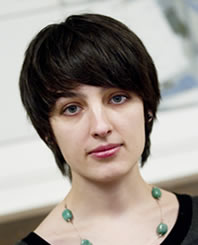 Elena KostyuchenkoThe Fritt Ord Foundation, Oslo, and the ZEIT Foundation, Hamburg, cooperate to award press prizes to journalists and media in Russia and Eastern Europe. The press prizes are intended to support the independent role of journalists, despite reprisals and financial difficulties, to encourage them not to be intimidated by censorship and to resist self-censorship.
Elena KostyuchenkoThe Fritt Ord Foundation, Oslo, and the ZEIT Foundation, Hamburg, cooperate to award press prizes to journalists and media in Russia and Eastern Europe. The press prizes are intended to support the independent role of journalists, despite reprisals and financial difficulties, to encourage them not to be intimidated by censorship and to resist self-censorship.
Quality, professionalism and courage are qualities that distinguish the journalists who receive the Gerd Bucerius Free Press of Eastern Europe Award and the Freedom of Expression Foundation's Press Prize for Russia. Since 2000, the ZEIT Foundation has awarded prizes to newspapers and journalists who strive to promote a free press, free speech and liberal civil societies in the transition states of Eastern Europe. Since 2004, the ZEIT Foundation has awarded press prizes in collaboration with the Freedom of Expression Foundation, Oslo.
“Our reporters, jury members and both foundations are following the increasing tension in Eastern Europe. The development is alarming, also for the work of journalists and media institutions. Work conditions are worsening. The extreme pressure exerted on journalists makes their work – especially independent journalism – more challenging” says Theo Sommer, Editor-at-Large at DIE ZEIT and chair of the jury for the press prizes.
Several prizes are made available each year for newspapers or Internet media, including at least one for a medium in Russia. In addition, special prizes are usually awarded to journalists.
The prizes for newspapers are for amounts of up to EUR 40 000, and to journalists, EUR 10 000. The prize laureates themselves decide how the money will be spent, as long as it benefits the individual newspaper or journalist.
Call for applications for 2015
The press prizes are earmarked for newspapers, Internet media and journalists from Russia, Belarus, the Ukraine, Georgia and South Caucasus. The foundations would like to express their support for newspapers and journalists in larger cities as well as for regional media aimed at strengthening the press in rural areas.
The newspapers are to demonstrate broad editorial initiatives in at least three areas, one of which should be foreign policy. They should be able to demonstrate balanced coverage of political, cultural, economic and social affairs. They must show a commitment to democracy, international understanding and freedom of expression.
The deadline for applications for 2015 is 10 November 2014. Nominations should be accompanied by explanations of the reasons for the nominations, and newspaper or sample articles (contact address: The Fritt Ord Foundation, Bente Roalsvig: .(JavaScript must be enabled to view this email address), or Hanne Vorland: .(JavaScript must be enabled to view this email address). Nominations must contain information about the publisher, editorial board, circulation statistics and the newspaper or internet media's history, as well as an evaluation of the newspaper. If you nominate a journalist, please include their CV. A media or journalist may not nominate themselves.
The decisions are taken by an independent jury consisting of Falk Bomsdorf, Munich; Jo Groebel, Berlin; Martin Paulsen, Bergen; Stefanie Schiffer, Berlin; Theo Sommer, Hamburg; Vibeke von Sperling, Oslo/Copenhagen; Michael Thumann, Istanbul; Reinhard Veser, Frankfurt am Main.
The jury meeting will take place in January/February 2015. The Press Prizes will be awarded in in June 2015 in Oslo.
The public utility ZEIT Foundation was founded in 1971 by Gerd Bucerius. Its objective is to promote the development of the civil society. The ZEIT Foundation's programme areas encompass "Science and Research", "Art and Culture", and "Knowledge and Education". The flagships among the Foundation's commitments are the Bucerius Law School in Hamburg and the arts venue known as the Bucerius Kunst Forum, located in the heart of that Hanseatic city.
Prize laureates in 2014
Russia
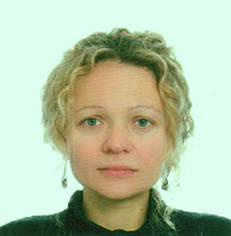 Maria EismontMaria Eismont (1974), Moscow, writes for the magazine The New Times and is a columnist in the newspaper Vedomosti. Her main focus is on social issues: she writes about breaches of human rights, about Russia's legal and prison systems and about adoption. Maria Eismont was nominated by the movement "Prisoners in Russia" and by Zoia Svetova.
Maria EismontMaria Eismont (1974), Moscow, writes for the magazine The New Times and is a columnist in the newspaper Vedomosti. Her main focus is on social issues: she writes about breaches of human rights, about Russia's legal and prison systems and about adoption. Maria Eismont was nominated by the movement "Prisoners in Russia" and by Zoia Svetova.
Dozhd TV (Moscow) was founded in 2010, and is the only independent TV channel in the country. The Internet-based Dozhd TV ensures considerable variation in its programming and debates as a counterbalance to official Russian propaganda. The public gets information through analytical and critical programmes, as well as through humorous ones. The station is constantly under pressure. Dozhd TV was nominated by the Norwegian Helsinki Committee and the Human Rights House Foundation, Oslo.
Ukraine
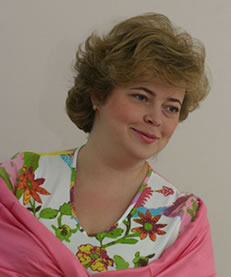 Yulia MostavaYulia Mostava (1968), Kiev, has been editor-in-chief of the weekly newspaper Dzerkalo Tyzhnia/Zerkalo Nedeli since 2011. It is an independent, critical publication that reflects her personal style. Yulia Mostova's essays on domestic and foreign policy topics are invariably well-grounded. She is considered to be an exceptionally knowledgeable analytical journalist, and she has been named "journalist of the year" several times. Friedrich-Naumann-Stiftung für die Freiheit nominated Yulia Mostava.
Yulia MostavaYulia Mostava (1968), Kiev, has been editor-in-chief of the weekly newspaper Dzerkalo Tyzhnia/Zerkalo Nedeli since 2011. It is an independent, critical publication that reflects her personal style. Yulia Mostova's essays on domestic and foreign policy topics are invariably well-grounded. She is considered to be an exceptionally knowledgeable analytical journalist, and she has been named "journalist of the year" several times. Friedrich-Naumann-Stiftung für die Freiheit nominated Yulia Mostava.
Yulia Mostova (1968), Kiev, har vært sjefredaktør for ukeavisen Dzerkalo Tyzhnia/Zerkalo Nedeli siden 2011. Det er en uavhengig, kritisk publikasjon som bærer hennes preg. Yulia Mostovas essays om innenriks- og utenrikspolitiske emner er alltid velbegrunnede. Hun anses for å være en av de mest kunnskapsrike analytiske journalistene, og hun har blitt kåret til «årets journalist» flere ganger. Friedrich-Naumann-Stiftung für die Freiheit har nominert Yulia Mostava.
Mustafa Nayyem (1981), Kiev, is a journalist and activist. He writes investigative articles for Ukrainian Pravda, where he is also a blogger. Mustafa Nayyem, who was born in Kabul, founded the Internet channel Hromadske.tv, which has turned out to be an important source of news for the so-called Euromaidan. Nayyem's appeals on Facebook helped initiate the pro-European demonstrations on Euromaidan. Intajour – the International Academy of Journalism, Hamburg, nominated Mustafa Nayyem.
Belarus
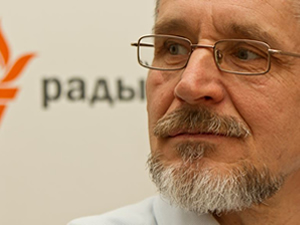 Aliaksandr KlaskouskiThe journalist and the political commentator Aliaksandr Klaskouski (1958), Minsk, is one of the most respected independent political journalists in Belarus. He heads the news agency BelaPAN's analytical projects. As a shrewd observer of the situation in Belarus, he brings very special depth to his analyses. He does not hesitate from criticising the politics of the country's political leadership. Aliaksandr Klaskouski was nominated by the German Embassy in Minsk and by the Friedrich-Naumann-Stiftung für die Freihet in Kiev.
Aliaksandr KlaskouskiThe journalist and the political commentator Aliaksandr Klaskouski (1958), Minsk, is one of the most respected independent political journalists in Belarus. He heads the news agency BelaPAN's analytical projects. As a shrewd observer of the situation in Belarus, he brings very special depth to his analyses. He does not hesitate from criticising the politics of the country's political leadership. Aliaksandr Klaskouski was nominated by the German Embassy in Minsk and by the Friedrich-Naumann-Stiftung für die Freihet in Kiev.
Azerbaijan
The Internet channel Objective TV (Baku) informs the Azerbaijani public about breaches of human rights and the activities of citizens worthy of criticism. As opposed to the eight official government-controlled stations in the country, Objective TV reports alternative and independent news, without building up the cult status of President Aliyev. The channel focuses on the far-reaching problem of corruption. Objective TV was nominated by the Norwegian Helsinki Committee and the Human Rights House Foundation, Oslo.
Armenia
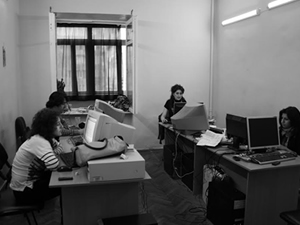 Epress.amThe news website Epress.am (Yerevan) reports regularly on protest campaigns and draws attention to doubtful practices on the part of the police force and the civil service, especially in the Caucasus region. The news website focuses on human rights, and discloses mistakes in police investigations, corruption cases and abuses of power. It also addresses cases of unsolved deaths of soldiers and torture perpetrated by government officials. Epress.am was nominated by the Norwegian Helsinki Committee and the Human Rights House Foundation, Oslo.
Epress.amThe news website Epress.am (Yerevan) reports regularly on protest campaigns and draws attention to doubtful practices on the part of the police force and the civil service, especially in the Caucasus region. The news website focuses on human rights, and discloses mistakes in police investigations, corruption cases and abuses of power. It also addresses cases of unsolved deaths of soldiers and torture perpetrated by government officials. Epress.am was nominated by the Norwegian Helsinki Committee and the Human Rights House Foundation, Oslo.
Prize laureates in 2013
Russia
 Elena KostyuchenkoElena Kostyuchenko (1987) is one of the most talented younger investigative journalists in Russia. She has worked for Novaya Gazeta (http://en.novayagazeta.ru/) since she was 17 years old, and she also has her own blog. She covers an impressive variety of topics, ranging from the case of Mikhail Beketov and the Khimki Forest to the massacre at Kushchevskaya. She writes about the lives of prostitutes who work along the main thoroughfares and about neglected hospitals. She is a champion of gay rights. Kostyuchenko was the first journalist to write about the Russian punk band Pussy Riot. By covering cases that draw attention to the link between organised crime and corrupt authorities, she moves through dangerous territory. She has been both assaulted and arrested for her journalistic activities. Elena Kostyuchenko was nominated by the Norwegian Helsinki Committee and the Human Rights House Foundation, Oslo, as well as by Ilja Krieger, editor, Corpus Publishing House, Moscow.
Elena KostyuchenkoElena Kostyuchenko (1987) is one of the most talented younger investigative journalists in Russia. She has worked for Novaya Gazeta (http://en.novayagazeta.ru/) since she was 17 years old, and she also has her own blog. She covers an impressive variety of topics, ranging from the case of Mikhail Beketov and the Khimki Forest to the massacre at Kushchevskaya. She writes about the lives of prostitutes who work along the main thoroughfares and about neglected hospitals. She is a champion of gay rights. Kostyuchenko was the first journalist to write about the Russian punk band Pussy Riot. By covering cases that draw attention to the link between organised crime and corrupt authorities, she moves through dangerous territory. She has been both assaulted and arrested for her journalistic activities. Elena Kostyuchenko was nominated by the Norwegian Helsinki Committee and the Human Rights House Foundation, Oslo, as well as by Ilja Krieger, editor, Corpus Publishing House, Moscow.
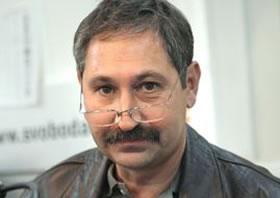 Alexander GoltsAlexander Golts (1955) is a political commentator and acting editor-in-chief of the critical online newspaper Ezhenedelny Zhurnal (http://www.ej.ru/). He is an outstanding communicator on issues involving armament and the armed forces, which is sensitive terrain for a journalist to navigate in Russia. Despite years of resistance and attacks, Golts has continued to abide by the principle of remaining faithful to the facts. His strength lies in his level-headed analytical presentations. Golts' deeply appreciated articles about the evolution of Russian domestic and foreign policy are available in English in the Moscow Times (at http://www.themoscowtimes.com/). Alexander Golts was nominated by Klaus-Helge Donath, a Russia correspondent for taz.
Alexander GoltsAlexander Golts (1955) is a political commentator and acting editor-in-chief of the critical online newspaper Ezhenedelny Zhurnal (http://www.ej.ru/). He is an outstanding communicator on issues involving armament and the armed forces, which is sensitive terrain for a journalist to navigate in Russia. Despite years of resistance and attacks, Golts has continued to abide by the principle of remaining faithful to the facts. His strength lies in his level-headed analytical presentations. Golts' deeply appreciated articles about the evolution of Russian domestic and foreign policy are available in English in the Moscow Times (at http://www.themoscowtimes.com/). Alexander Golts was nominated by Klaus-Helge Donath, a Russia correspondent for taz.
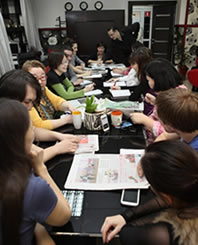 Redaksjonen i Yakutsk VecherniyThe weekly newspaper Yakutsk Vecherniy (http://www.vecherniy.com/) has been published since 1994 in the Yakutsk region of northern Siberia. Under the leadership of Editor-in-chief Maria Ivanova, the bold, voluminous regional newspaper covers both environmental destruction and corruption. In the winter of 2011/2012, the newspaper sent its own correspondent to Moscow to cover the demonstrations in the capital city. Before that, the newspaper opposed raising a memorial to Stalin. In 2005, the weekly newspaper sued the city administration for overly hard taxation of the citizenry. The newspaper is embroiled in several court cases, and its journalists are used to State agencies' attempts to control them. Yakutsk Vecherniy was nominated by Moritz Gathmann in Moscow.
Redaksjonen i Yakutsk VecherniyThe weekly newspaper Yakutsk Vecherniy (http://www.vecherniy.com/) has been published since 1994 in the Yakutsk region of northern Siberia. Under the leadership of Editor-in-chief Maria Ivanova, the bold, voluminous regional newspaper covers both environmental destruction and corruption. In the winter of 2011/2012, the newspaper sent its own correspondent to Moscow to cover the demonstrations in the capital city. Before that, the newspaper opposed raising a memorial to Stalin. In 2005, the weekly newspaper sued the city administration for overly hard taxation of the citizenry. The newspaper is embroiled in several court cases, and its journalists are used to State agencies' attempts to control them. Yakutsk Vecherniy was nominated by Moritz Gathmann in Moscow.
Ukraine
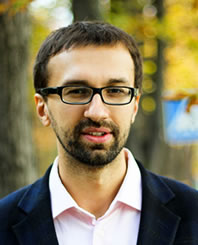 Sergey LeschenkoSergey Leschenko (1980) from Kiev is one of the best investigative journalists in Ukraine. He writes for the online newspaper Ukrainska Prawda (http://www.pravda.com.ua/), where he is also the acting editor. Leschenko is one of the most active bloggers in the same newspaper. He files detailed reports on matters such as corruption among the power elite. In connection with the preparations for the soccer world championships in 2012, he wrote a number of critical articles about who got awarded contracts and what they earned on them. As a journalist, he is impartial, giving precedence to objective descriptions. He has a firm grasp of the political situation in Ukraine, and maintains the necessary distance from both the government and the opposition. Sergey Leschenko was nominated by Heike Dörrenbächer, head of Deutschen Gesellschaft für Osteuropakunde in Berlin.
Sergey LeschenkoSergey Leschenko (1980) from Kiev is one of the best investigative journalists in Ukraine. He writes for the online newspaper Ukrainska Prawda (http://www.pravda.com.ua/), where he is also the acting editor. Leschenko is one of the most active bloggers in the same newspaper. He files detailed reports on matters such as corruption among the power elite. In connection with the preparations for the soccer world championships in 2012, he wrote a number of critical articles about who got awarded contracts and what they earned on them. As a journalist, he is impartial, giving precedence to objective descriptions. He has a firm grasp of the political situation in Ukraine, and maintains the necessary distance from both the government and the opposition. Sergey Leschenko was nominated by Heike Dörrenbächer, head of Deutschen Gesellschaft für Osteuropakunde in Berlin.
Azerbaijan
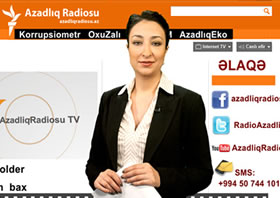 Tahmina TagizadeTahmina Tagizade (1982) is above all active as an independent, experienced journalist in the provincial town of Ganja and the surrounding region in northern Azerbaijan. She has championed the rights of the general public, often at great cost to her personally. Despite reprisals on the part of a conservative, authoritarian administration, Tagizade continues tirelessly in the pursuit of her journalistic activities. She has her own blog (tahminatagizade.wordpress.com), on which she stands out as a prudent commentator and observer. For years, she has been a coordinator, journalist and editor at the Ganja Media Centre. She is currently working for Radio Free Europe/Radio Liberty's Azerbaijani service, Radio Azadliq, as a Vaclav Havel Journalism Fellow, a prize awarded by RFE/RL in conjunction with the Czech government, and for the website civil-forum.az where she is also video editor. Tahmina Tagizade was nominated by the German Embassy in Baku.
Tahmina TagizadeTahmina Tagizade (1982) is above all active as an independent, experienced journalist in the provincial town of Ganja and the surrounding region in northern Azerbaijan. She has championed the rights of the general public, often at great cost to her personally. Despite reprisals on the part of a conservative, authoritarian administration, Tagizade continues tirelessly in the pursuit of her journalistic activities. She has her own blog (tahminatagizade.wordpress.com), on which she stands out as a prudent commentator and observer. For years, she has been a coordinator, journalist and editor at the Ganja Media Centre. She is currently working for Radio Free Europe/Radio Liberty's Azerbaijani service, Radio Azadliq, as a Vaclav Havel Journalism Fellow, a prize awarded by RFE/RL in conjunction with the Czech government, and for the website civil-forum.az where she is also video editor. Tahmina Tagizade was nominated by the German Embassy in Baku.
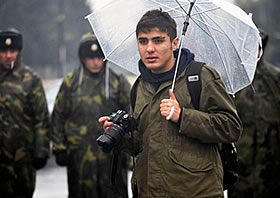 Mehman HuseynovMehman Huseynov (1990) is a photojournalist, and his expressive photos and videos depict different aspects of Azerbaijan. His photojournalism often documents abuses of human rights. His documentation of the demolition of homes in connection with the Eurovision Song Contest in Baku in 2012 was deeply appreciated by the public, but also caused him to be detained for hooliganism. He was released, but more serious charges were brought against him a few days later. Huseynov has his own YouTube channel (http://www.youtube.com/user/HOSTEL19AZ), and works for the Institute for Reporters' Freedom and Safety and for the Turan News Agency. Mekhman Huseynov was nominated by the journalist Zamin Haci of Baku.
Mehman HuseynovMehman Huseynov (1990) is a photojournalist, and his expressive photos and videos depict different aspects of Azerbaijan. His photojournalism often documents abuses of human rights. His documentation of the demolition of homes in connection with the Eurovision Song Contest in Baku in 2012 was deeply appreciated by the public, but also caused him to be detained for hooliganism. He was released, but more serious charges were brought against him a few days later. Huseynov has his own YouTube channel (http://www.youtube.com/user/HOSTEL19AZ), and works for the Institute for Reporters' Freedom and Safety and for the Turan News Agency. Mekhman Huseynov was nominated by the journalist Zamin Haci of Baku.
Prize laureates in 2012
Khadija Ismayilova, Azerbaijan
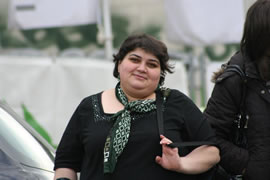 Khadija IsmayilovaWith her critical radio broadcasts for Radio Free Europe/Radio Liberty and her astute articles on corruption, the abuse of power of power and breaches of human rights, Khadija Ismayilova from Baku is one of the most important investigative journalists in Azerbaijan. Her discomforting, fearless stories have not been without disturbing consequences. A mudslinging campaign has tried to ensure her silence: "I will resist this campaign to destroy my reputation, and I will continue my activities. As a journalist who takes her work seriously, I have no other choice." Her courage and head-on treatment of oppression once again serve to emphasise Khadija Ismayilova's strength, underlining her conviction that free speech cannot be silenced.
Khadija IsmayilovaWith her critical radio broadcasts for Radio Free Europe/Radio Liberty and her astute articles on corruption, the abuse of power of power and breaches of human rights, Khadija Ismayilova from Baku is one of the most important investigative journalists in Azerbaijan. Her discomforting, fearless stories have not been without disturbing consequences. A mudslinging campaign has tried to ensure her silence: "I will resist this campaign to destroy my reputation, and I will continue my activities. As a journalist who takes her work seriously, I have no other choice." Her courage and head-on treatment of oppression once again serve to emphasise Khadija Ismayilova's strength, underlining her conviction that free speech cannot be silenced.
Khadija Ismayilova was nominated by the Norwegian Helsinki Committee and the Human Rights House Foundation, Oslo, and by Markus Löning, Federal Government Commissioner for Human Rights Policy and Humanitarian Aid at the Federal Foreign Office in Berlin, Germany.
DOSH, Russia
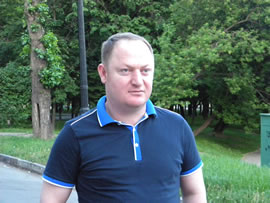 Israpil ShovkhalovDOSH describes itself as a "the first independent Caucasian magazine". The editorial offices in Grosny and Moscow as well as their network of correspondents in the Caucasian sub-republic present reports on historical, cultural and political aspects of life in the northern Caucasus. They emphasise that there has been no breakthrough for human rights. Editor-in-chief Israpil Shovkhalov believes in the power of words in a violent region that has been marked by war. In this region, where the people live under constant pressure and have been deprived of their rights, and where most of the media play down conflicts, DOSH’ decade of fearless journalism has shed light on human rights in Chechnya and is a prime example of how things can be done.
Israpil ShovkhalovDOSH describes itself as a "the first independent Caucasian magazine". The editorial offices in Grosny and Moscow as well as their network of correspondents in the Caucasian sub-republic present reports on historical, cultural and political aspects of life in the northern Caucasus. They emphasise that there has been no breakthrough for human rights. Editor-in-chief Israpil Shovkhalov believes in the power of words in a violent region that has been marked by war. In this region, where the people live under constant pressure and have been deprived of their rights, and where most of the media play down conflicts, DOSH’ decade of fearless journalism has shed light on human rights in Chechnya and is a prime example of how things can be done.
DOSH was nominated by Peter Normann Waage, Oslo, and Norwegian P.E.N.
Olga Romanova, Russia
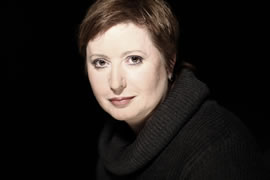 Olga RomanovaOlga Romanova is brave. Through her columns in The New Times and her blog, she casts light on the shadowy system of justice in her native Russia. She brings striking stories to light based on the conviction that independent media and reports are two sides of the same coin. Thanks to her journalistic efforts, she managed to get her husband Alexey Koslov out of jail. Journalist and activist Olga Romanova is a unique entity, a keen observer who provides explanatory information to the political protest movement without being aligned with any political party or with the opposition. The fact that her husband has been imprisoned once again demonstrates how zealous political commitment is punished. Above all, this is about the importance of having an incorruptible eye, and knowing the value of clear speech.
Olga RomanovaOlga Romanova is brave. Through her columns in The New Times and her blog, she casts light on the shadowy system of justice in her native Russia. She brings striking stories to light based on the conviction that independent media and reports are two sides of the same coin. Thanks to her journalistic efforts, she managed to get her husband Alexey Koslov out of jail. Journalist and activist Olga Romanova is a unique entity, a keen observer who provides explanatory information to the political protest movement without being aligned with any political party or with the opposition. The fact that her husband has been imprisoned once again demonstrates how zealous political commitment is punished. Above all, this is about the importance of having an incorruptible eye, and knowing the value of clear speech.
Olga Romanova was nominated by the Norwegian Helsinki Committee and the Human Rights House Foundation, Oslo.
Valery Karbalevich, Belarus
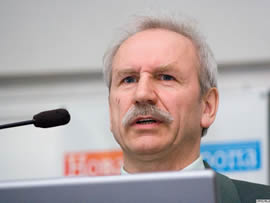 Valery Karbalevich Valery Karbalevich , editor-in-chief of the journal Gramadzjanskaja Alternatiwa and a leading political commentator in Svobodnyje Novosti Plus in Minsk, ranks among the most important independent commentators on the Belorussian media landscape. This historian's strength is his ability to analyse. Judicious and courageous, he combines a profound knowledge of history with level-headed and vigilant judgment. His biography of President Alexander Lukashenko cannot be obtained in Belarus. Despite massive government propaganda and obstacles put in the way of his work, Valerij Karbalevitsj has refused to be intimidated. His personality and his writings also ensure that the hope of democratic development in Belarus is not necessarily in vain.
Valery Karbalevich Valery Karbalevich , editor-in-chief of the journal Gramadzjanskaja Alternatiwa and a leading political commentator in Svobodnyje Novosti Plus in Minsk, ranks among the most important independent commentators on the Belorussian media landscape. This historian's strength is his ability to analyse. Judicious and courageous, he combines a profound knowledge of history with level-headed and vigilant judgment. His biography of President Alexander Lukashenko cannot be obtained in Belarus. Despite massive government propaganda and obstacles put in the way of his work, Valerij Karbalevitsj has refused to be intimidated. His personality and his writings also ensure that the hope of democratic development in Belarus is not necessarily in vain.
Valery Karbalevich was nominated by the German Embassy in Minsk.
Ukrainskyi Tyzhden, Ukraine
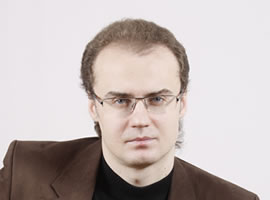 Sergey LitvinenkoThe weekly magazine Ukrainskyi Tyzhden, published in the Ukrainian capital Kiev, and its editor-in-chief Sergey Litvinenko, have charted a pro-European course. That is also true of the monthly English-language international version Ukrainian Week. The growing pressures on independent media in Ukraine also affect a Ukrainian-language magazine like Ukrainskyi Tyzhden. There are distribution problems in the eastern part of the country in particular, and partial shipments are confiscated. When confronted with this, it has been important for Litvinenko and his editorial committee to strengthen the independent national awareness of their readership – not for nationalistic reasons, but rather as a signal in the direction of Europe.
Sergey LitvinenkoThe weekly magazine Ukrainskyi Tyzhden, published in the Ukrainian capital Kiev, and its editor-in-chief Sergey Litvinenko, have charted a pro-European course. That is also true of the monthly English-language international version Ukrainian Week. The growing pressures on independent media in Ukraine also affect a Ukrainian-language magazine like Ukrainskyi Tyzhden. There are distribution problems in the eastern part of the country in particular, and partial shipments are confiscated. When confronted with this, it has been important for Litvinenko and his editorial committee to strengthen the independent national awareness of their readership – not for nationalistic reasons, but rather as a signal in the direction of Europe.
Ukrainskyi Tyzhden was nominated by the Goethe Institute in Ukraine.
The decisions have been taken by an independent jury consisting of Falk Bomsdorf (Munich), Jo Groebel (Berlin), Gro Holm (Oslo), Stefanie Schiffer (Berlin), Theo Sommer (Hamburg), Vibeke Sperling (Oslo/Copenhagen), Michael Thumann (Istanbul) and Reinhard Veser (Frankfurt am Main).
Prize laureates in 2011
Russia
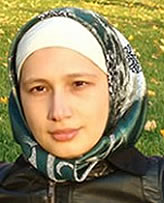 Nadira Isaeva, Editor-in-Chief ChernovikThe weekly newspaper Chernovik from Machatschkala in the Republic of Dagestan in North Caucasus writes, among other things, about special assignments handled by the militia and the security forces, criticising their methods and examining questionable methods used to fight the war on terror. The editorial board also writes critically and constructively about the authorities' commercial transactions. The newspaper has repeatedly been accused and received threats of closure due to alleged extremism and protest. The prize is EUR 20 000. The weekly newspaper was nominated by the Norwegian Union of Journalists, Norwegian PEN, Human Rights House, Oslo, and the Norwegian Helsinki Committee. Website: www.chernovik.net
Nadira Isaeva, Editor-in-Chief ChernovikThe weekly newspaper Chernovik from Machatschkala in the Republic of Dagestan in North Caucasus writes, among other things, about special assignments handled by the militia and the security forces, criticising their methods and examining questionable methods used to fight the war on terror. The editorial board also writes critically and constructively about the authorities' commercial transactions. The newspaper has repeatedly been accused and received threats of closure due to alleged extremism and protest. The prize is EUR 20 000. The weekly newspaper was nominated by the Norwegian Union of Journalists, Norwegian PEN, Human Rights House, Oslo, and the Norwegian Helsinki Committee. Website: www.chernovik.net
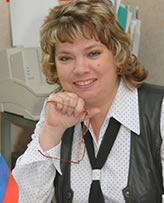 Natalja IvanishinaThe journalist Natalya Ivanishina works at the newspaper Ust-Ilimskaya Pravda in the Siberian city of Ust-Ilimsk in Irkutsk. She mainly covers news from the judicial system and the courts. She undertakes independent journalistic investigations of court cases and legal proceedings. Ivanishina writes about individuals who are embroiled in legal red tape and covers stubborn cases of criminal persecution and corruption in the judicial system and among the authorities. The prize is EUR 10 000. She was nominated by Albina Bezzubenko, attorney-at-law.
Natalja IvanishinaThe journalist Natalya Ivanishina works at the newspaper Ust-Ilimskaya Pravda in the Siberian city of Ust-Ilimsk in Irkutsk. She mainly covers news from the judicial system and the courts. She undertakes independent journalistic investigations of court cases and legal proceedings. Ivanishina writes about individuals who are embroiled in legal red tape and covers stubborn cases of criminal persecution and corruption in the judicial system and among the authorities. The prize is EUR 10 000. She was nominated by Albina Bezzubenko, attorney-at-law.
Azerbaijan
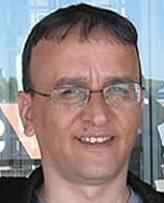 Zamin HajiThe journalist Zamin Haji writes for the newspapers Yeni Müsavat and Azadliq, among others. Haji makes fearless efforts to promote freedom of expression and democratisation. His articles, analyses and shrewd columns deal with misruling, the abuse of power and corruption cases. He is considered one of the country's best investigative journalists, and is famous for his ironic, somewhat sarcastic style. He has been subjected to countless sanctions and personal assaults. The prize is EUR 10 000. He was nominated by Shahvalad Chobanoglu, Baku, Human Rights House, Oslo, and the Norwegian Helsinki Committee.
Zamin HajiThe journalist Zamin Haji writes for the newspapers Yeni Müsavat and Azadliq, among others. Haji makes fearless efforts to promote freedom of expression and democratisation. His articles, analyses and shrewd columns deal with misruling, the abuse of power and corruption cases. He is considered one of the country's best investigative journalists, and is famous for his ironic, somewhat sarcastic style. He has been subjected to countless sanctions and personal assaults. The prize is EUR 10 000. He was nominated by Shahvalad Chobanoglu, Baku, Human Rights House, Oslo, and the Norwegian Helsinki Committee.
Armenia
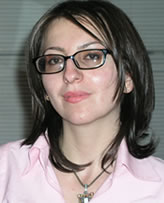 Karine Asatryan, Editor-in-Chief A1+The news portal A1+ covers the activities of the opposition, the government's work and parliamentary events. The journalists devote a great deal of attention to social problems, the situation in the regions and civilian organisations. A1+ delivers independent assessments and commentaries, and their direct broadcasts on the Internet are relevant and nuanced. The prize is EUR 10 000. The news portal was nominated by Human Rights House, Oslo, and the Norwegian Helsinki Committee. Website: www.a1plus.am
Karine Asatryan, Editor-in-Chief A1+The news portal A1+ covers the activities of the opposition, the government's work and parliamentary events. The journalists devote a great deal of attention to social problems, the situation in the regions and civilian organisations. A1+ delivers independent assessments and commentaries, and their direct broadcasts on the Internet are relevant and nuanced. The prize is EUR 10 000. The news portal was nominated by Human Rights House, Oslo, and the Norwegian Helsinki Committee. Website: www.a1plus.am
Belarus
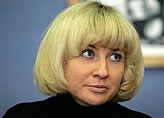 Maryna KoktyshThe journalist Maryna Koktysh writes for the newspaper Narodnaja Volja in Minsk, where she is deputy editor-in-chief. Koktysh covered all the main highlights of the presidential election in December 2010. With alacrity, she criticised the undermining of democratic and legal principles. Her strength lies in conducting interviews. She carries on conversations about social policy and personal topics with everyone from critics of the regime to government representatives. Despite massive pressure, she refuses to be silenced. The prize is EUR 10 000. She was nominated by the German embassy in Minsk.
Maryna KoktyshThe journalist Maryna Koktysh writes for the newspaper Narodnaja Volja in Minsk, where she is deputy editor-in-chief. Koktysh covered all the main highlights of the presidential election in December 2010. With alacrity, she criticised the undermining of democratic and legal principles. Her strength lies in conducting interviews. She carries on conversations about social policy and personal topics with everyone from critics of the regime to government representatives. Despite massive pressure, she refuses to be silenced. The prize is EUR 10 000. She was nominated by the German embassy in Minsk.
Ukraine
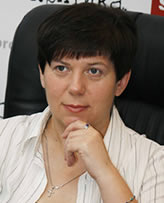 Natalja LigachovaThe journalist Natalja Ligachova works for the Internet newspaper Telekritika in Kiev. Telekritika is a forum for discussions about freedom of the press, professional standards, press ethics, human rights and journalistic solidarity. Ligachova observes and analyses media trends, and she writes independently and in a well-balanced manner about the Ukrainian media landscape. By virtue of its role as gatekeeper, Telekritika is an important voice in Ukraine. The prize is EUR 10 000. She was nominated by Markus Löning of the German Ministry of Foreign Affairs in Berlin. Website: www.telekritika.ua
Natalja LigachovaThe journalist Natalja Ligachova works for the Internet newspaper Telekritika in Kiev. Telekritika is a forum for discussions about freedom of the press, professional standards, press ethics, human rights and journalistic solidarity. Ligachova observes and analyses media trends, and she writes independently and in a well-balanced manner about the Ukrainian media landscape. By virtue of its role as gatekeeper, Telekritika is an important voice in Ukraine. The prize is EUR 10 000. She was nominated by Markus Löning of the German Ministry of Foreign Affairs in Berlin. Website: www.telekritika.ua
Prize laureates in 2010
Mikhail Beketov was editor and founder of the local newspaper Khimkinskaya Pravda, in which he wrote, for example, a series of articles about preserving the forest lands in Khimki (a suburb of Moscow), while the local authorities were building a new motorway from St. Petersburg to Moscow. After receiving threats for his journalistic activities, Beketov was assaulted and beaten in 2008. He was disabled and became an invalid as a result of the attack. Beketov was nominated by the Norwegian Helsinki Committee and the Human Rights House Foundation, Oslo. The prize is EUR 10 000.
Arsenjevskije Vesti is a weekly newspaper published in the Primor region of Vladivostok. The newspaper reports independently, analytically and courageously on controversial topics such as corruption and smuggling. Arsenjevskije Vesti is also a champion of the rights of the individual. In the past, the newspaper's premises have been set on fire and, on several occasions, its computers have been confiscated. The newspaper was nominated by the Norwegian Helsinki Committee and the Human Rights House Foundation, Oslo. The prize is EUR 15 000.
In Belarus, Borisovskije Novosti, the dynamic district newspaper and the largest regional newspaper in the country first and foremost presents local news. Despite pressure from the State and persecution, the newspaper provides critical, independent coverage of political issues. The weekly newspaper was nominated by Andrej Dynko, Nasha Niva, Sergej Satsuk, Ejednevnik, Irina Vidanava and Rodger Potocki, Director for Europe and Eurasia, National Endowment for Democracy (NED), Washington, D.C. The prize is EUR 15 000.
The journal Liberali from Tbilisi has very quickly carved out a position as one of the most influential printed media in Georgia. The journal presents relevant political discussions, for example, on changes in voting rights or on the conflict in Abkhazia. The journal was nominated by the Norwegian Helsinki Committee and the Human Rights House Foundation, Oslo. The prize is EUR 10 000.
The investigative journalist Shahvalad Chobanoglu, Baku, writes critical columns and revealing articles for opposition newspapers, not least about the links between government and the oligarchy. His journalism is distinguished by thoroughness, professionalism – and irony. Chobanoglu was nominated by Azer Ahmadov, Azadliq and Natiq Gavadli. The prize is EUR 10 000.
The only independent Azerbaijani TV-medium ANTV Online TV, Baku, airs features one cannot see on State-operated TV. Featuring chat fora and blogs in connection with a variety of topics, the medium communicates a realistic picture of Azerbaijan. ANTV was nominated by the Norwegian Helsinki Committee and the Human Rights House Foundation, Oslo. The prize is EUR 10 000.
The journalist Edik Baghdasaryan, Jerevan, is the publisher of the Internet newspaper Hetq Online and founder of the NGO Investigative Journalist – both of which are intended to foster independent journalism in Armenia. He writes astutely and matter-of-factly about topics of scientific, political and social relevance. Baghdasaryan was nominated by Marianna Grigoryan. The prize is EUR 10 000.
Press Prizes for Russia and Eastern Europe
 Elena KostyuchenkoThe Fritt Ord Foundation, Oslo, and the ZEIT Foundation, Hamburg, cooperate to award press prizes to journalists and media in Russia and Eastern Europe. The press prizes are intended to support the independent role of journalists, despite reprisals and financial difficulties, to encourage them not to be intimidated by censorship and to resist self-censorship.
Elena KostyuchenkoThe Fritt Ord Foundation, Oslo, and the ZEIT Foundation, Hamburg, cooperate to award press prizes to journalists and media in Russia and Eastern Europe. The press prizes are intended to support the independent role of journalists, despite reprisals and financial difficulties, to encourage them not to be intimidated by censorship and to resist self-censorship.
Quality, professionalism and courage are qualities that distinguish the journalists who receive the Gerd Bucerius Free Press of Eastern Europe Award and the Freedom of Expression Foundation's Press Prize for Russia. Since 2000, the ZEIT Foundation has awarded prizes to newspapers and journalists who strive to promote a free press, free speech and liberal civil societies in the transition states of Eastern Europe. Since 2004, the ZEIT Foundation has awarded press prizes in collaboration with the Freedom of Expression Foundation, Oslo.
“Our reporters, jury members and both foundations are following the increasing tension in Eastern Europe. The development is alarming, also for the work of journalists and media institutions. Work conditions are worsening. The extreme pressure exerted on journalists makes their work – especially independent journalism – more challenging” says Theo Sommer, Editor-at-Large at DIE ZEIT and chair of the jury for the press prizes.
Several prizes are made available each year for newspapers or Internet media, including at least one for a medium in Russia. In addition, special prizes are usually awarded to journalists.
The prizes for newspapers are for amounts of up to EUR 40 000, and to journalists, EUR 10 000. The prize laureates themselves decide how the money will be spent, as long as it benefits the individual newspaper or journalist.
Call for applications for 2015
The press prizes are earmarked for newspapers, Internet media and journalists from Russia, Belarus, the Ukraine, Georgia and South Caucasus. The foundations would like to express their support for newspapers and journalists in larger cities as well as for regional media aimed at strengthening the press in rural areas.
The newspapers are to demonstrate broad editorial initiatives in at least three areas, one of which should be foreign policy. They should be able to demonstrate balanced coverage of political, cultural, economic and social affairs. They must show a commitment to democracy, international understanding and freedom of expression.
The deadline for applications for 2015 is 10 November 2014. Nominations should be accompanied by explanations of the reasons for the nominations, and newspaper or sample articles (contact address: The Fritt Ord Foundation, Bente Roalsvig: .(JavaScript must be enabled to view this email address), or Hanne Vorland: .(JavaScript must be enabled to view this email address). Nominations must contain information about the publisher, editorial board, circulation statistics and the newspaper or internet media's history, as well as an evaluation of the newspaper. If you nominate a journalist, please include their CV. A media or journalist may not nominate themselves.
The decisions are taken by an independent jury consisting of Falk Bomsdorf, Munich; Jo Groebel, Berlin; Martin Paulsen, Bergen; Stefanie Schiffer, Berlin; Theo Sommer, Hamburg; Vibeke von Sperling, Oslo/Copenhagen; Michael Thumann, Istanbul; Reinhard Veser, Frankfurt am Main.
The jury meeting will take place in January/February 2015. The Press Prizes will be awarded in in June 2015 in Oslo.
The public utility ZEIT Foundation was founded in 1971 by Gerd Bucerius. Its objective is to promote the development of the civil society. The ZEIT Foundation's programme areas encompass "Science and Research", "Art and Culture", and "Knowledge and Education". The flagships among the Foundation's commitments are the Bucerius Law School in Hamburg and the arts venue known as the Bucerius Kunst Forum, located in the heart of that Hanseatic city.

Elena Kostyuchenko
Prize laureates in 2014
Russia
 Maria EismontMaria Eismont (1974), Moscow, writes for the magazine The New Times and is a columnist in the newspaper Vedomosti. Her main focus is on social issues: she writes about breaches of human rights, about Russia's legal and prison systems and about adoption. Maria Eismont was nominated by the movement "Prisoners in Russia" and by Zoia Svetova.
Maria EismontMaria Eismont (1974), Moscow, writes for the magazine The New Times and is a columnist in the newspaper Vedomosti. Her main focus is on social issues: she writes about breaches of human rights, about Russia's legal and prison systems and about adoption. Maria Eismont was nominated by the movement "Prisoners in Russia" and by Zoia Svetova.
Dozhd TV (Moscow) was founded in 2010, and is the only independent TV channel in the country. The Internet-based Dozhd TV ensures considerable variation in its programming and debates as a counterbalance to official Russian propaganda. The public gets information through analytical and critical programmes, as well as through humorous ones. The station is constantly under pressure. Dozhd TV was nominated by the Norwegian Helsinki Committee and the Human Rights House Foundation, Oslo.
Ukraine
 Yulia MostavaYulia Mostava (1968), Kiev, has been editor-in-chief of the weekly newspaper Dzerkalo Tyzhnia/Zerkalo Nedeli since 2011. It is an independent, critical publication that reflects her personal style. Yulia Mostova's essays on domestic and foreign policy topics are invariably well-grounded. She is considered to be an exceptionally knowledgeable analytical journalist, and she has been named "journalist of the year" several times. Friedrich-Naumann-Stiftung für die Freiheit nominated Yulia Mostava.
Yulia MostavaYulia Mostava (1968), Kiev, has been editor-in-chief of the weekly newspaper Dzerkalo Tyzhnia/Zerkalo Nedeli since 2011. It is an independent, critical publication that reflects her personal style. Yulia Mostova's essays on domestic and foreign policy topics are invariably well-grounded. She is considered to be an exceptionally knowledgeable analytical journalist, and she has been named "journalist of the year" several times. Friedrich-Naumann-Stiftung für die Freiheit nominated Yulia Mostava.
Yulia Mostova (1968), Kiev, har vært sjefredaktør for ukeavisen Dzerkalo Tyzhnia/Zerkalo Nedeli siden 2011. Det er en uavhengig, kritisk publikasjon som bærer hennes preg. Yulia Mostovas essays om innenriks- og utenrikspolitiske emner er alltid velbegrunnede. Hun anses for å være en av de mest kunnskapsrike analytiske journalistene, og hun har blitt kåret til «årets journalist» flere ganger. Friedrich-Naumann-Stiftung für die Freiheit har nominert Yulia Mostava.
Mustafa Nayyem (1981), Kiev, is a journalist and activist. He writes investigative articles for Ukrainian Pravda, where he is also a blogger. Mustafa Nayyem, who was born in Kabul, founded the Internet channel Hromadske.tv, which has turned out to be an important source of news for the so-called Euromaidan. Nayyem's appeals on Facebook helped initiate the pro-European demonstrations on Euromaidan. Intajour – the International Academy of Journalism, Hamburg, nominated Mustafa Nayyem.
Belarus
 Aliaksandr KlaskouskiThe journalist and the political commentator Aliaksandr Klaskouski (1958), Minsk, is one of the most respected independent political journalists in Belarus. He heads the news agency BelaPAN's analytical projects. As a shrewd observer of the situation in Belarus, he brings very special depth to his analyses. He does not hesitate from criticising the politics of the country's political leadership. Aliaksandr Klaskouski was nominated by the German Embassy in Minsk and by the Friedrich-Naumann-Stiftung für die Freihet in Kiev.
Aliaksandr KlaskouskiThe journalist and the political commentator Aliaksandr Klaskouski (1958), Minsk, is one of the most respected independent political journalists in Belarus. He heads the news agency BelaPAN's analytical projects. As a shrewd observer of the situation in Belarus, he brings very special depth to his analyses. He does not hesitate from criticising the politics of the country's political leadership. Aliaksandr Klaskouski was nominated by the German Embassy in Minsk and by the Friedrich-Naumann-Stiftung für die Freihet in Kiev.
Azerbaijan
The Internet channel Objective TV (Baku) informs the Azerbaijani public about breaches of human rights and the activities of citizens worthy of criticism. As opposed to the eight official government-controlled stations in the country, Objective TV reports alternative and independent news, without building up the cult status of President Aliyev. The channel focuses on the far-reaching problem of corruption. Objective TV was nominated by the Norwegian Helsinki Committee and the Human Rights House Foundation, Oslo.
Armenia
 Epress.amThe news website Epress.am (Yerevan) reports regularly on protest campaigns and draws attention to doubtful practices on the part of the police force and the civil service, especially in the Caucasus region. The news website focuses on human rights, and discloses mistakes in police investigations, corruption cases and abuses of power. It also addresses cases of unsolved deaths of soldiers and torture perpetrated by government officials. Epress.am was nominated by the Norwegian Helsinki Committee and the Human Rights House Foundation, Oslo.
Epress.amThe news website Epress.am (Yerevan) reports regularly on protest campaigns and draws attention to doubtful practices on the part of the police force and the civil service, especially in the Caucasus region. The news website focuses on human rights, and discloses mistakes in police investigations, corruption cases and abuses of power. It also addresses cases of unsolved deaths of soldiers and torture perpetrated by government officials. Epress.am was nominated by the Norwegian Helsinki Committee and the Human Rights House Foundation, Oslo.
Prize laureates in 2013
Russia
 Elena KostyuchenkoElena Kostyuchenko (1987) is one of the most talented younger investigative journalists in Russia. She has worked for Novaya Gazeta (http://en.novayagazeta.ru/) since she was 17 years old, and she also has her own blog. She covers an impressive variety of topics, ranging from the case of Mikhail Beketov and the Khimki Forest to the massacre at Kushchevskaya. She writes about the lives of prostitutes who work along the main thoroughfares and about neglected hospitals. She is a champion of gay rights. Kostyuchenko was the first journalist to write about the Russian punk band Pussy Riot. By covering cases that draw attention to the link between organised crime and corrupt authorities, she moves through dangerous territory. She has been both assaulted and arrested for her journalistic activities. Elena Kostyuchenko was nominated by the Norwegian Helsinki Committee and the Human Rights House Foundation, Oslo, as well as by Ilja Krieger, editor, Corpus Publishing House, Moscow.
Elena KostyuchenkoElena Kostyuchenko (1987) is one of the most talented younger investigative journalists in Russia. She has worked for Novaya Gazeta (http://en.novayagazeta.ru/) since she was 17 years old, and she also has her own blog. She covers an impressive variety of topics, ranging from the case of Mikhail Beketov and the Khimki Forest to the massacre at Kushchevskaya. She writes about the lives of prostitutes who work along the main thoroughfares and about neglected hospitals. She is a champion of gay rights. Kostyuchenko was the first journalist to write about the Russian punk band Pussy Riot. By covering cases that draw attention to the link between organised crime and corrupt authorities, she moves through dangerous territory. She has been both assaulted and arrested for her journalistic activities. Elena Kostyuchenko was nominated by the Norwegian Helsinki Committee and the Human Rights House Foundation, Oslo, as well as by Ilja Krieger, editor, Corpus Publishing House, Moscow.
 Alexander GoltsAlexander Golts (1955) is a political commentator and acting editor-in-chief of the critical online newspaper Ezhenedelny Zhurnal (http://www.ej.ru/). He is an outstanding communicator on issues involving armament and the armed forces, which is sensitive terrain for a journalist to navigate in Russia. Despite years of resistance and attacks, Golts has continued to abide by the principle of remaining faithful to the facts. His strength lies in his level-headed analytical presentations. Golts' deeply appreciated articles about the evolution of Russian domestic and foreign policy are available in English in the Moscow Times (at http://www.themoscowtimes.com/). Alexander Golts was nominated by Klaus-Helge Donath, a Russia correspondent for taz.
Alexander GoltsAlexander Golts (1955) is a political commentator and acting editor-in-chief of the critical online newspaper Ezhenedelny Zhurnal (http://www.ej.ru/). He is an outstanding communicator on issues involving armament and the armed forces, which is sensitive terrain for a journalist to navigate in Russia. Despite years of resistance and attacks, Golts has continued to abide by the principle of remaining faithful to the facts. His strength lies in his level-headed analytical presentations. Golts' deeply appreciated articles about the evolution of Russian domestic and foreign policy are available in English in the Moscow Times (at http://www.themoscowtimes.com/). Alexander Golts was nominated by Klaus-Helge Donath, a Russia correspondent for taz.
 Redaksjonen i Yakutsk VecherniyThe weekly newspaper Yakutsk Vecherniy (http://www.vecherniy.com/) has been published since 1994 in the Yakutsk region of northern Siberia. Under the leadership of Editor-in-chief Maria Ivanova, the bold, voluminous regional newspaper covers both environmental destruction and corruption. In the winter of 2011/2012, the newspaper sent its own correspondent to Moscow to cover the demonstrations in the capital city. Before that, the newspaper opposed raising a memorial to Stalin. In 2005, the weekly newspaper sued the city administration for overly hard taxation of the citizenry. The newspaper is embroiled in several court cases, and its journalists are used to State agencies' attempts to control them. Yakutsk Vecherniy was nominated by Moritz Gathmann in Moscow.
Redaksjonen i Yakutsk VecherniyThe weekly newspaper Yakutsk Vecherniy (http://www.vecherniy.com/) has been published since 1994 in the Yakutsk region of northern Siberia. Under the leadership of Editor-in-chief Maria Ivanova, the bold, voluminous regional newspaper covers both environmental destruction and corruption. In the winter of 2011/2012, the newspaper sent its own correspondent to Moscow to cover the demonstrations in the capital city. Before that, the newspaper opposed raising a memorial to Stalin. In 2005, the weekly newspaper sued the city administration for overly hard taxation of the citizenry. The newspaper is embroiled in several court cases, and its journalists are used to State agencies' attempts to control them. Yakutsk Vecherniy was nominated by Moritz Gathmann in Moscow.
Ukraine
 Sergey LeschenkoSergey Leschenko (1980) from Kiev is one of the best investigative journalists in Ukraine. He writes for the online newspaper Ukrainska Prawda (http://www.pravda.com.ua/), where he is also the acting editor. Leschenko is one of the most active bloggers in the same newspaper. He files detailed reports on matters such as corruption among the power elite. In connection with the preparations for the soccer world championships in 2012, he wrote a number of critical articles about who got awarded contracts and what they earned on them. As a journalist, he is impartial, giving precedence to objective descriptions. He has a firm grasp of the political situation in Ukraine, and maintains the necessary distance from both the government and the opposition. Sergey Leschenko was nominated by Heike Dörrenbächer, head of Deutschen Gesellschaft für Osteuropakunde in Berlin.
Sergey LeschenkoSergey Leschenko (1980) from Kiev is one of the best investigative journalists in Ukraine. He writes for the online newspaper Ukrainska Prawda (http://www.pravda.com.ua/), where he is also the acting editor. Leschenko is one of the most active bloggers in the same newspaper. He files detailed reports on matters such as corruption among the power elite. In connection with the preparations for the soccer world championships in 2012, he wrote a number of critical articles about who got awarded contracts and what they earned on them. As a journalist, he is impartial, giving precedence to objective descriptions. He has a firm grasp of the political situation in Ukraine, and maintains the necessary distance from both the government and the opposition. Sergey Leschenko was nominated by Heike Dörrenbächer, head of Deutschen Gesellschaft für Osteuropakunde in Berlin.
Azerbaijan
 Tahmina TagizadeTahmina Tagizade (1982) is above all active as an independent, experienced journalist in the provincial town of Ganja and the surrounding region in northern Azerbaijan. She has championed the rights of the general public, often at great cost to her personally. Despite reprisals on the part of a conservative, authoritarian administration, Tagizade continues tirelessly in the pursuit of her journalistic activities. She has her own blog (tahminatagizade.wordpress.com), on which she stands out as a prudent commentator and observer. For years, she has been a coordinator, journalist and editor at the Ganja Media Centre. She is currently working for Radio Free Europe/Radio Liberty's Azerbaijani service, Radio Azadliq, as a Vaclav Havel Journalism Fellow, a prize awarded by RFE/RL in conjunction with the Czech government, and for the website civil-forum.az where she is also video editor. Tahmina Tagizade was nominated by the German Embassy in Baku.
Tahmina TagizadeTahmina Tagizade (1982) is above all active as an independent, experienced journalist in the provincial town of Ganja and the surrounding region in northern Azerbaijan. She has championed the rights of the general public, often at great cost to her personally. Despite reprisals on the part of a conservative, authoritarian administration, Tagizade continues tirelessly in the pursuit of her journalistic activities. She has her own blog (tahminatagizade.wordpress.com), on which she stands out as a prudent commentator and observer. For years, she has been a coordinator, journalist and editor at the Ganja Media Centre. She is currently working for Radio Free Europe/Radio Liberty's Azerbaijani service, Radio Azadliq, as a Vaclav Havel Journalism Fellow, a prize awarded by RFE/RL in conjunction with the Czech government, and for the website civil-forum.az where she is also video editor. Tahmina Tagizade was nominated by the German Embassy in Baku.
 Mehman HuseynovMehman Huseynov (1990) is a photojournalist, and his expressive photos and videos depict different aspects of Azerbaijan. His photojournalism often documents abuses of human rights. His documentation of the demolition of homes in connection with the Eurovision Song Contest in Baku in 2012 was deeply appreciated by the public, but also caused him to be detained for hooliganism. He was released, but more serious charges were brought against him a few days later. Huseynov has his own YouTube channel (http://www.youtube.com/user/HOSTEL19AZ), and works for the Institute for Reporters' Freedom and Safety and for the Turan News Agency. Mekhman Huseynov was nominated by the journalist Zamin Haci of Baku.
Mehman HuseynovMehman Huseynov (1990) is a photojournalist, and his expressive photos and videos depict different aspects of Azerbaijan. His photojournalism often documents abuses of human rights. His documentation of the demolition of homes in connection with the Eurovision Song Contest in Baku in 2012 was deeply appreciated by the public, but also caused him to be detained for hooliganism. He was released, but more serious charges were brought against him a few days later. Huseynov has his own YouTube channel (http://www.youtube.com/user/HOSTEL19AZ), and works for the Institute for Reporters' Freedom and Safety and for the Turan News Agency. Mekhman Huseynov was nominated by the journalist Zamin Haci of Baku.
Prize laureates in 2012
Khadija Ismayilova, Azerbaijan
 Khadija IsmayilovaWith her critical radio broadcasts for Radio Free Europe/Radio Liberty and her astute articles on corruption, the abuse of power of power and breaches of human rights, Khadija Ismayilova from Baku is one of the most important investigative journalists in Azerbaijan. Her discomforting, fearless stories have not been without disturbing consequences. A mudslinging campaign has tried to ensure her silence: "I will resist this campaign to destroy my reputation, and I will continue my activities. As a journalist who takes her work seriously, I have no other choice." Her courage and head-on treatment of oppression once again serve to emphasise Khadija Ismayilova's strength, underlining her conviction that free speech cannot be silenced.
Khadija IsmayilovaWith her critical radio broadcasts for Radio Free Europe/Radio Liberty and her astute articles on corruption, the abuse of power of power and breaches of human rights, Khadija Ismayilova from Baku is one of the most important investigative journalists in Azerbaijan. Her discomforting, fearless stories have not been without disturbing consequences. A mudslinging campaign has tried to ensure her silence: "I will resist this campaign to destroy my reputation, and I will continue my activities. As a journalist who takes her work seriously, I have no other choice." Her courage and head-on treatment of oppression once again serve to emphasise Khadija Ismayilova's strength, underlining her conviction that free speech cannot be silenced.
Khadija Ismayilova was nominated by the Norwegian Helsinki Committee and the Human Rights House Foundation, Oslo, and by Markus Löning, Federal Government Commissioner for Human Rights Policy and Humanitarian Aid at the Federal Foreign Office in Berlin, Germany.
DOSH, Russia
 Israpil ShovkhalovDOSH describes itself as a "the first independent Caucasian magazine". The editorial offices in Grosny and Moscow as well as their network of correspondents in the Caucasian sub-republic present reports on historical, cultural and political aspects of life in the northern Caucasus. They emphasise that there has been no breakthrough for human rights. Editor-in-chief Israpil Shovkhalov believes in the power of words in a violent region that has been marked by war. In this region, where the people live under constant pressure and have been deprived of their rights, and where most of the media play down conflicts, DOSH’ decade of fearless journalism has shed light on human rights in Chechnya and is a prime example of how things can be done.
Israpil ShovkhalovDOSH describes itself as a "the first independent Caucasian magazine". The editorial offices in Grosny and Moscow as well as their network of correspondents in the Caucasian sub-republic present reports on historical, cultural and political aspects of life in the northern Caucasus. They emphasise that there has been no breakthrough for human rights. Editor-in-chief Israpil Shovkhalov believes in the power of words in a violent region that has been marked by war. In this region, where the people live under constant pressure and have been deprived of their rights, and where most of the media play down conflicts, DOSH’ decade of fearless journalism has shed light on human rights in Chechnya and is a prime example of how things can be done.
DOSH was nominated by Peter Normann Waage, Oslo, and Norwegian P.E.N.
Olga Romanova, Russia
 Olga RomanovaOlga Romanova is brave. Through her columns in The New Times and her blog, she casts light on the shadowy system of justice in her native Russia. She brings striking stories to light based on the conviction that independent media and reports are two sides of the same coin. Thanks to her journalistic efforts, she managed to get her husband Alexey Koslov out of jail. Journalist and activist Olga Romanova is a unique entity, a keen observer who provides explanatory information to the political protest movement without being aligned with any political party or with the opposition. The fact that her husband has been imprisoned once again demonstrates how zealous political commitment is punished. Above all, this is about the importance of having an incorruptible eye, and knowing the value of clear speech.
Olga RomanovaOlga Romanova is brave. Through her columns in The New Times and her blog, she casts light on the shadowy system of justice in her native Russia. She brings striking stories to light based on the conviction that independent media and reports are two sides of the same coin. Thanks to her journalistic efforts, she managed to get her husband Alexey Koslov out of jail. Journalist and activist Olga Romanova is a unique entity, a keen observer who provides explanatory information to the political protest movement without being aligned with any political party or with the opposition. The fact that her husband has been imprisoned once again demonstrates how zealous political commitment is punished. Above all, this is about the importance of having an incorruptible eye, and knowing the value of clear speech.
Olga Romanova was nominated by the Norwegian Helsinki Committee and the Human Rights House Foundation, Oslo.
Valery Karbalevich, Belarus
 Valery Karbalevich Valery Karbalevich , editor-in-chief of the journal Gramadzjanskaja Alternatiwa and a leading political commentator in Svobodnyje Novosti Plus in Minsk, ranks among the most important independent commentators on the Belorussian media landscape. This historian's strength is his ability to analyse. Judicious and courageous, he combines a profound knowledge of history with level-headed and vigilant judgment. His biography of President Alexander Lukashenko cannot be obtained in Belarus. Despite massive government propaganda and obstacles put in the way of his work, Valerij Karbalevitsj has refused to be intimidated. His personality and his writings also ensure that the hope of democratic development in Belarus is not necessarily in vain.
Valery Karbalevich Valery Karbalevich , editor-in-chief of the journal Gramadzjanskaja Alternatiwa and a leading political commentator in Svobodnyje Novosti Plus in Minsk, ranks among the most important independent commentators on the Belorussian media landscape. This historian's strength is his ability to analyse. Judicious and courageous, he combines a profound knowledge of history with level-headed and vigilant judgment. His biography of President Alexander Lukashenko cannot be obtained in Belarus. Despite massive government propaganda and obstacles put in the way of his work, Valerij Karbalevitsj has refused to be intimidated. His personality and his writings also ensure that the hope of democratic development in Belarus is not necessarily in vain.
Valery Karbalevich was nominated by the German Embassy in Minsk.
Ukrainskyi Tyzhden, Ukraine
 Sergey LitvinenkoThe weekly magazine Ukrainskyi Tyzhden, published in the Ukrainian capital Kiev, and its editor-in-chief Sergey Litvinenko, have charted a pro-European course. That is also true of the monthly English-language international version Ukrainian Week. The growing pressures on independent media in Ukraine also affect a Ukrainian-language magazine like Ukrainskyi Tyzhden. There are distribution problems in the eastern part of the country in particular, and partial shipments are confiscated. When confronted with this, it has been important for Litvinenko and his editorial committee to strengthen the independent national awareness of their readership – not for nationalistic reasons, but rather as a signal in the direction of Europe.
Sergey LitvinenkoThe weekly magazine Ukrainskyi Tyzhden, published in the Ukrainian capital Kiev, and its editor-in-chief Sergey Litvinenko, have charted a pro-European course. That is also true of the monthly English-language international version Ukrainian Week. The growing pressures on independent media in Ukraine also affect a Ukrainian-language magazine like Ukrainskyi Tyzhden. There are distribution problems in the eastern part of the country in particular, and partial shipments are confiscated. When confronted with this, it has been important for Litvinenko and his editorial committee to strengthen the independent national awareness of their readership – not for nationalistic reasons, but rather as a signal in the direction of Europe.
Ukrainskyi Tyzhden was nominated by the Goethe Institute in Ukraine.
The decisions have been taken by an independent jury consisting of Falk Bomsdorf (Munich), Jo Groebel (Berlin), Gro Holm (Oslo), Stefanie Schiffer (Berlin), Theo Sommer (Hamburg), Vibeke Sperling (Oslo/Copenhagen), Michael Thumann (Istanbul) and Reinhard Veser (Frankfurt am Main).
Prize laureates in 2011
Russia
 Nadira Isaeva, Editor-in-Chief ChernovikThe weekly newspaper Chernovik from Machatschkala in the Republic of Dagestan in North Caucasus writes, among other things, about special assignments handled by the militia and the security forces, criticising their methods and examining questionable methods used to fight the war on terror. The editorial board also writes critically and constructively about the authorities' commercial transactions. The newspaper has repeatedly been accused and received threats of closure due to alleged extremism and protest. The prize is EUR 20 000. The weekly newspaper was nominated by the Norwegian Union of Journalists, Norwegian PEN, Human Rights House, Oslo, and the Norwegian Helsinki Committee. Website: www.chernovik.net
Nadira Isaeva, Editor-in-Chief ChernovikThe weekly newspaper Chernovik from Machatschkala in the Republic of Dagestan in North Caucasus writes, among other things, about special assignments handled by the militia and the security forces, criticising their methods and examining questionable methods used to fight the war on terror. The editorial board also writes critically and constructively about the authorities' commercial transactions. The newspaper has repeatedly been accused and received threats of closure due to alleged extremism and protest. The prize is EUR 20 000. The weekly newspaper was nominated by the Norwegian Union of Journalists, Norwegian PEN, Human Rights House, Oslo, and the Norwegian Helsinki Committee. Website: www.chernovik.net
 Natalja IvanishinaThe journalist Natalya Ivanishina works at the newspaper Ust-Ilimskaya Pravda in the Siberian city of Ust-Ilimsk in Irkutsk. She mainly covers news from the judicial system and the courts. She undertakes independent journalistic investigations of court cases and legal proceedings. Ivanishina writes about individuals who are embroiled in legal red tape and covers stubborn cases of criminal persecution and corruption in the judicial system and among the authorities. The prize is EUR 10 000. She was nominated by Albina Bezzubenko, attorney-at-law.
Natalja IvanishinaThe journalist Natalya Ivanishina works at the newspaper Ust-Ilimskaya Pravda in the Siberian city of Ust-Ilimsk in Irkutsk. She mainly covers news from the judicial system and the courts. She undertakes independent journalistic investigations of court cases and legal proceedings. Ivanishina writes about individuals who are embroiled in legal red tape and covers stubborn cases of criminal persecution and corruption in the judicial system and among the authorities. The prize is EUR 10 000. She was nominated by Albina Bezzubenko, attorney-at-law.
Azerbaijan
 Zamin HajiThe journalist Zamin Haji writes for the newspapers Yeni Müsavat and Azadliq, among others. Haji makes fearless efforts to promote freedom of expression and democratisation. His articles, analyses and shrewd columns deal with misruling, the abuse of power and corruption cases. He is considered one of the country's best investigative journalists, and is famous for his ironic, somewhat sarcastic style. He has been subjected to countless sanctions and personal assaults. The prize is EUR 10 000. He was nominated by Shahvalad Chobanoglu, Baku, Human Rights House, Oslo, and the Norwegian Helsinki Committee.
Zamin HajiThe journalist Zamin Haji writes for the newspapers Yeni Müsavat and Azadliq, among others. Haji makes fearless efforts to promote freedom of expression and democratisation. His articles, analyses and shrewd columns deal with misruling, the abuse of power and corruption cases. He is considered one of the country's best investigative journalists, and is famous for his ironic, somewhat sarcastic style. He has been subjected to countless sanctions and personal assaults. The prize is EUR 10 000. He was nominated by Shahvalad Chobanoglu, Baku, Human Rights House, Oslo, and the Norwegian Helsinki Committee.
Armenia
 Karine Asatryan, Editor-in-Chief A1+The news portal A1+ covers the activities of the opposition, the government's work and parliamentary events. The journalists devote a great deal of attention to social problems, the situation in the regions and civilian organisations. A1+ delivers independent assessments and commentaries, and their direct broadcasts on the Internet are relevant and nuanced. The prize is EUR 10 000. The news portal was nominated by Human Rights House, Oslo, and the Norwegian Helsinki Committee. Website: www.a1plus.am
Karine Asatryan, Editor-in-Chief A1+The news portal A1+ covers the activities of the opposition, the government's work and parliamentary events. The journalists devote a great deal of attention to social problems, the situation in the regions and civilian organisations. A1+ delivers independent assessments and commentaries, and their direct broadcasts on the Internet are relevant and nuanced. The prize is EUR 10 000. The news portal was nominated by Human Rights House, Oslo, and the Norwegian Helsinki Committee. Website: www.a1plus.am
Belarus
 Maryna KoktyshThe journalist Maryna Koktysh writes for the newspaper Narodnaja Volja in Minsk, where she is deputy editor-in-chief. Koktysh covered all the main highlights of the presidential election in December 2010. With alacrity, she criticised the undermining of democratic and legal principles. Her strength lies in conducting interviews. She carries on conversations about social policy and personal topics with everyone from critics of the regime to government representatives. Despite massive pressure, she refuses to be silenced. The prize is EUR 10 000. She was nominated by the German embassy in Minsk.
Maryna KoktyshThe journalist Maryna Koktysh writes for the newspaper Narodnaja Volja in Minsk, where she is deputy editor-in-chief. Koktysh covered all the main highlights of the presidential election in December 2010. With alacrity, she criticised the undermining of democratic and legal principles. Her strength lies in conducting interviews. She carries on conversations about social policy and personal topics with everyone from critics of the regime to government representatives. Despite massive pressure, she refuses to be silenced. The prize is EUR 10 000. She was nominated by the German embassy in Minsk.
Ukraine
 Natalja LigachovaThe journalist Natalja Ligachova works for the Internet newspaper Telekritika in Kiev. Telekritika is a forum for discussions about freedom of the press, professional standards, press ethics, human rights and journalistic solidarity. Ligachova observes and analyses media trends, and she writes independently and in a well-balanced manner about the Ukrainian media landscape. By virtue of its role as gatekeeper, Telekritika is an important voice in Ukraine. The prize is EUR 10 000. She was nominated by Markus Löning of the German Ministry of Foreign Affairs in Berlin. Website: www.telekritika.ua
Natalja LigachovaThe journalist Natalja Ligachova works for the Internet newspaper Telekritika in Kiev. Telekritika is a forum for discussions about freedom of the press, professional standards, press ethics, human rights and journalistic solidarity. Ligachova observes and analyses media trends, and she writes independently and in a well-balanced manner about the Ukrainian media landscape. By virtue of its role as gatekeeper, Telekritika is an important voice in Ukraine. The prize is EUR 10 000. She was nominated by Markus Löning of the German Ministry of Foreign Affairs in Berlin. Website: www.telekritika.ua
Prize laureates in 2010
Mikhail Beketov was editor and founder of the local newspaper Khimkinskaya Pravda, in which he wrote, for example, a series of articles about preserving the forest lands in Khimki (a suburb of Moscow), while the local authorities were building a new motorway from St. Petersburg to Moscow. After receiving threats for his journalistic activities, Beketov was assaulted and beaten in 2008. He was disabled and became an invalid as a result of the attack. Beketov was nominated by the Norwegian Helsinki Committee and the Human Rights House Foundation, Oslo. The prize is EUR 10 000.
Arsenjevskije Vesti is a weekly newspaper published in the Primor region of Vladivostok. The newspaper reports independently, analytically and courageously on controversial topics such as corruption and smuggling. Arsenjevskije Vesti is also a champion of the rights of the individual. In the past, the newspaper's premises have been set on fire and, on several occasions, its computers have been confiscated. The newspaper was nominated by the Norwegian Helsinki Committee and the Human Rights House Foundation, Oslo. The prize is EUR 15 000.
In Belarus, Borisovskije Novosti, the dynamic district newspaper and the largest regional newspaper in the country first and foremost presents local news. Despite pressure from the State and persecution, the newspaper provides critical, independent coverage of political issues. The weekly newspaper was nominated by Andrej Dynko, Nasha Niva, Sergej Satsuk, Ejednevnik, Irina Vidanava and Rodger Potocki, Director for Europe and Eurasia, National Endowment for Democracy (NED), Washington, D.C. The prize is EUR 15 000.
The journal Liberali from Tbilisi has very quickly carved out a position as one of the most influential printed media in Georgia. The journal presents relevant political discussions, for example, on changes in voting rights or on the conflict in Abkhazia. The journal was nominated by the Norwegian Helsinki Committee and the Human Rights House Foundation, Oslo. The prize is EUR 10 000.
The investigative journalist Shahvalad Chobanoglu, Baku, writes critical columns and revealing articles for opposition newspapers, not least about the links between government and the oligarchy. His journalism is distinguished by thoroughness, professionalism – and irony. Chobanoglu was nominated by Azer Ahmadov, Azadliq and Natiq Gavadli. The prize is EUR 10 000.
The only independent Azerbaijani TV-medium ANTV Online TV, Baku, airs features one cannot see on State-operated TV. Featuring chat fora and blogs in connection with a variety of topics, the medium communicates a realistic picture of Azerbaijan. ANTV was nominated by the Norwegian Helsinki Committee and the Human Rights House Foundation, Oslo. The prize is EUR 10 000.
The journalist Edik Baghdasaryan, Jerevan, is the publisher of the Internet newspaper Hetq Online and founder of the NGO Investigative Journalist – both of which are intended to foster independent journalism in Armenia. He writes astutely and matter-of-factly about topics of scientific, political and social relevance. Baghdasaryan was nominated by Marianna Grigoryan. The prize is EUR 10 000.

Maria Eismont

Yulia Mostava

Aliaksandr Klaskouski

Epress.am

Elena Kostyuchenko

Alexander Golts

Redaksjonen i Yakutsk Vecherniy

Sergey Leschenko

Tahmina Tagizade

Mehman Huseynov

Khadija Ismayilova

Israpil Shovkhalov

Olga Romanova

Valery Karbalevich

Sergey Litvinenko

Nadira Isaeva, Editor-in-Chief Chernovik

Natalja Ivanishina

Zamin Haji

Karine Asatryan, Editor-in-Chief A1+

Maryna Koktysh

Natalja Ligachova
Prizes


